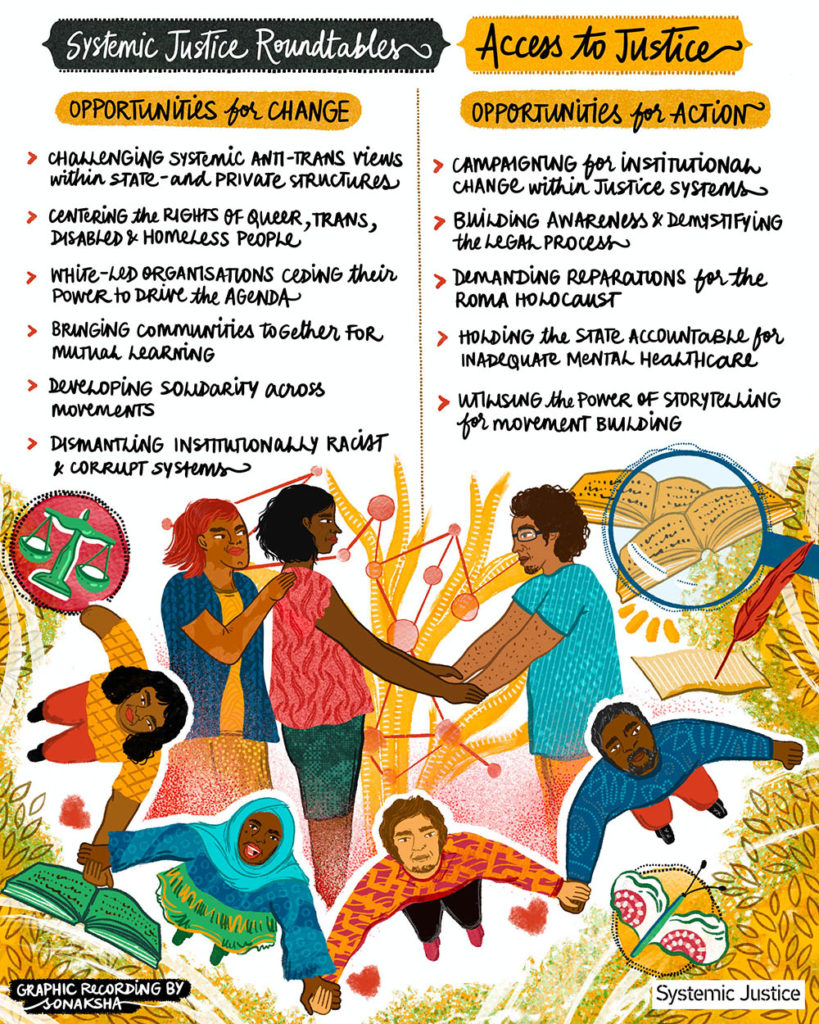“Part of our work is about reclaiming power through our intersectional identities, instead of seeing it as something that automatically labels us as victims when seeking justice.”
What can we do to empower those who are frequently marginalised within or shut out from legal systems to access justice and vindicate their rights?
Our rights and other legal protections are rendered redundant when we are unable to enforce them. For example, when a legal wrong has been perpetrated against us, we should be able to obtain redress or reparations, either through court or a dispute resolution body, in a timely and effective manner. When our rights are being judged by the courts then our right to a fair trial should be realised, which includes access to representation and a fair procedure. We should be able to access something like legal aid where necessary, and not be overburdened by expenses for enforcing our rights. We should also be protected from the violation of our rights in the first place: arbitrary arrest, or degrading treatment by the justice system.
In theory, we are all equal before the law. In reality, however, we know that “access to justice is open to all, just like the Ritz Hotel”. The doors to the courts may be open to everybody, but not everybody has the same experience trying to get through those doors, nor do they encounter the same dynamics when they are “in.” Those who experience marginalisation or oppression in society more generally often face a multitude of additional barriers to realising their rights, let alone on their own terms.

There are often huge financial burdens to pursuing legal options. Some groups have no right to statutory free legal representation and can’t afford to pay privately. Corrupt or institutionally racist systems can also be a barrier as this means there is no effective remedy, and no trust in the system even if one is able to bring a case.
On 12 and 13 May, we shared online space with 14 activists from across Europe to reflect (with the help of 3 interpreter teams!) on what is standing in the way of marginalised communities in accessing justice, and to identify opportunities for action to change this.
On the barriers front, many observations concerned the stigmatisation and exclusion of certain groups: refugees and migrants from certain jurisdictions encountering more discrimination than others; transphobic and homophobic views being engrained in State and private structures; and stigmatisation and criminalisation of sex workers were some of the examples mentioned. Participants also expressed frustration with a landscape in which white-led, non-grassroots organisations were driving much of the agenda, often with high visibility and taking up a lot of space and much of the funding available for this work. There was a feeling that after the summer of 2020, the interest to support racial justice work, and especially more radical work, had waned. This while, a participant pointed out, “collective resources are not a pie that needs to be sliced.”
Taking legal action can come with a certain level of visibility. This could be too high a cost for some, or it could even put some individuals at additional risk of repercussions. This was identified as a notable deterrent for pursuing justice. “People who are directly affected tend to not enforce their rights because there is little chance of change,” one participant said –– another flagged that going to court could pose a threat to their community members’ health and life.
And when legal action is taken, navigating that system brings additional challenges. Not only did participants speak to the absence of financial support to engage a lawyer, or having to contend with a legislature that keeps on adopting harmful legislation and eroding existing protections, getting legal counsel in and of itself often was a disenfranchising process. As one participant put it: “Lawyers always conduct themselves in a way that they think that, because of our lived experience, we need a saviour. We don’t: we need assistance, and we need help, but we also want to be partakers in the process.” Another participant echoed the need to take control: “Racism impacts our communities: they suffer so many human rights abuses. It’s our right to have something done about it. And we, the people with those experiences, are best placed to do that.”
Creating greater understanding between groups through education could lead to increased solidarity and collaboration between them, participants suggested. Especially in a context where “bigger NGOs drown out the voices of smaller grassroot movements who actually have an impact.” Building on successes, supporting each other, and staying mindful of the interconnectedness of different struggles were recurring themes throughout the conversation. “The solidarity is going to help us become stronger.”
To get the creative energy flowing for identifying opportunities for action, everyone drew a picture of where they saw opportunities for action in their area of work. There were a lot of hearts present in the images, and no shortage of ideas. Some of the opportunities identified were:
- Taking the State to court for violating its duty of care in providing adequate provisions for mental healthcare;
- Ending school segregation for Roma children;
- Getting acknowledgment of human rights for a collective instead of individuals only, moving beyond the supremacy of national identity;
- Reparations for and recognition of the Roma holocaust across Europe.
At the closing of the gathering, participants shared that they felt hopeful, inspired, and thankful for having connected with the group: “It feels good to see such a strong commitment amongst peers; it makes me optimistic that things can change”.
Sign up for our newsletter below to stay up-to-date about the priorities that emerge from our roundtables.
